U radu se analizira prevođenje latinske konstrukcije ablativ apsolutni u odabranim hrvatskoglagoljskim tekstovima prevedenim s latinskoga. Ablativ apsolutni u prijevodnim se tekstovima najčešće prevodi hrvatskim crkvenoslavenskim apsolutnim konstrukcijama u dativu ili instrumentalu. Dativ je apsolutni starija konstrukcija, čija pojava u tekstovima može poslužiti i za dataciju prijevoda. Instrumental se u prijevodima pojavljuje jer ga prevoditelji doživljavaju kao hrvatsku crkvenoslavensku istovrijednicu ablativa. Pri prijevodu ablativa apsolutnoga mnogo se češće pojavljuju apsolutne konstrukcije nego zavisne surečenice, koje su danas najčešće prijevodne istovrijednice te konstrukcije kako bi prijevod bio što vjerniji izvorniku. Pri prevođenju ablativa apsolutnoga apsolutnim konstrukcijama vjerno se oponaša red riječi izvornika. U radu se analiziraju načini prevođenja te konstrukcije te uporaba različitih participa kao istovrijednica latinskim participima koji su dio te konstrukcije.; In this paper we analyse the translations of the Latin ablative absolute in chosen Croato-Glagolitic texts that were translated from Latin. Ablative absolute is most frequently translated with the help of the Croatian Church Slavonic absolute structures in the dative or instrumental case. Dative absolute is an older structure and its appearance in a translation can be used to date it. The instrumental case appears in the translations because the translators see it as the Croatian Church Slavonic equivalent of the ablative. In the analysed translations absolute constructions were used more frequently than dependent clauses, which are nowadays used as translation equivalents in order to remain as close as possible to the original text. When translating the ablative absolute with the help of absolute constructions the word order from the original is closely mirrored. The Latin participle which is a part of that construction is translated by the present or past participle. Present participle is often translated by the past participle of perfective verbs when dealing with prefixed verbs and verbs which are considered as momentary by the translator (e.g. veniente abbate: opatь prišad'še).
Sažetak

 Fluminensia : časopis za filološka istraživanja : 31,1(2019) / glavni i odgovorni urednik Aleksandar Mijatović.
Fluminensia : časopis za filološka istraživanja : 31,1(2019) / glavni i odgovorni urednik Aleksandar Mijatović.